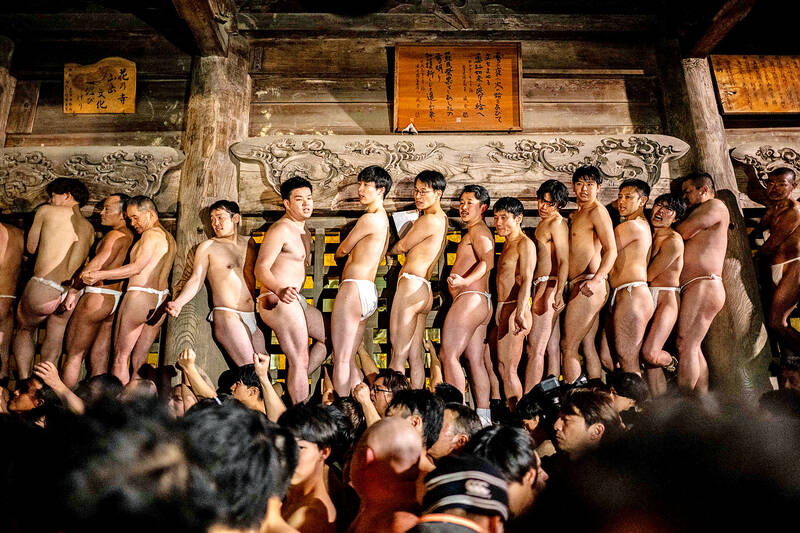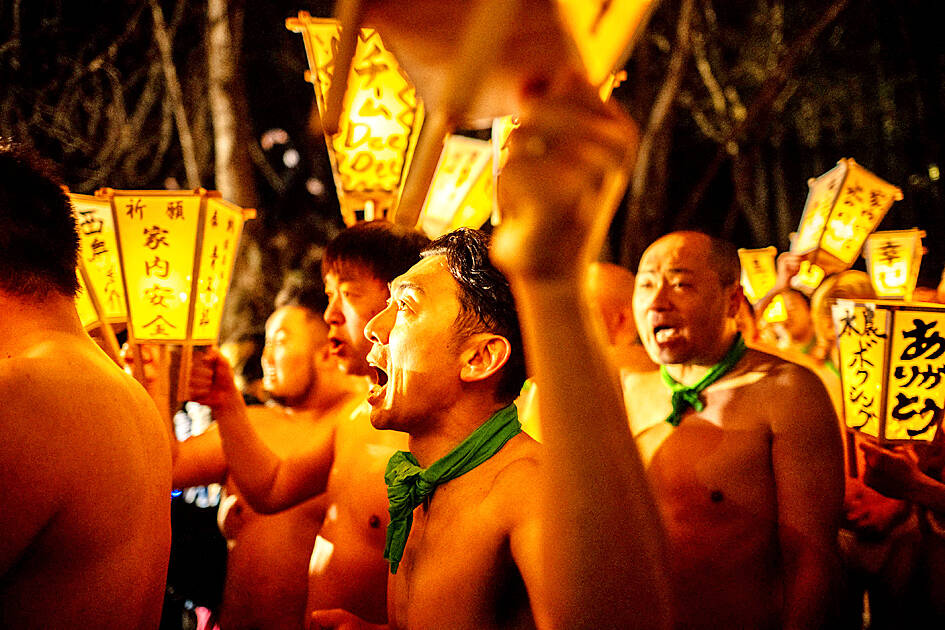A steam of sweat rose as hundreds of naked men tussled over a bag of wooden talismans, performing a dramatic end to a thousand-year-old ritual in Japan that took place for the last time.
Their passionate chants of “jasso, joyasa” (“evil, be gone”) echoed through a ceder forest in Japan’s Iwate Prefecture, where the secluded Kokuseki Temple is ending the popular annual rite.
Organizing the event, which draws hundreds of participants and thousands of tourists every year, has become a heavy burden for the aging local faithful, who find it hard to keep up with the rigors of the ritual.

Photo: AFP
The Sominsai festival, regarded as one of the strangest festivals in Japan, is the latest tradition affected by the country’s aging population crisis that has hit rural communities hard.
“It is very difficult to organize a festival of this scale,” said Daigo Fujinami, a resident monk of the temple, which opened in 729.
“You can see what happened today — so many people are here and it’s all exciting, but behind the scenes, there are many rituals and so much work that have to be done,” he said. “I cannot be blind to the difficult reality.”

Photo: AFP
Japan’s society has aged more rapidly than most other countries’. The trend has forced countless schools, shops and services to close, particularly in small or rural communities.
Kokuseki Temple’s Sominsai festival used to take place from the seventh day of Lunar New Year through to the following morning, but during the COVID-19 pandemic, it was scaled down to prayer ceremonies and smaller rituals.
The final festival was a shortened version, ending at about 1pm, but it drew the biggest crowd in recent memory, local residents said.
As the sun set, men in white loincloths came to the mountainous temple, bathed in a creek and marched around temple’s ground. They clenched their fists against the chill of a winter breeze, all the while chanting “jasso joyasa.”
Some held small cameras to record their experience, while dozens of television crews followed them through the temple’s stone steps and dirt pathways.
As the festival reached its climax, hundreds of men packed inside the wooden temple shouting, chanting and aggressively jostling over a bag of talismans.
Toshiaki Kikuchi, a local resident who claimed the talismans and who has helped organize the festival for years, said he hoped the ritual would return one day.
“Even under a different format, I hope to maintain this tradition,” he said. “There are many things that you can appreciate only if you take part.”
Many participants and visitors voiced sadness and understanding about the festival’s ending.
“This is the last of this great festival that has lasted 1,000 years. I really wanted to participate in this festival,” said Yasuo Nishimura, 49, a caregiver from Osaka.
Other temples across Japan continue to host similar festivals where men wear loincloths and bathe in freezing water or fight over talismans.
Some festivals are adjusting their rules in line with changing demographics and social norms so that they can continue to exist — such as letting women take part in previously male-only ceremonies.
From next year, Kokuseki Temple plans to replace the festival with prayer ceremonies and other ways to continue its spiritual practices.
“Japan is facing a falling birthrate, aging population and lack of young people to continue various things,” Nishimura said. “Perhaps it is difficult to continue the same way as in the past.”

The Philippines yesterday said its coast guard would acquire 40 fast patrol craft from France, with plans to deploy some of them in disputed areas of the South China Sea. The deal is the “largest so far single purchase” in Manila’s ongoing effort to modernize its coast guard, with deliveries set to start in four years, Philippine Coast Guard Commandant Admiral Ronnie Gil Gavan told a news conference. He declined to provide specifications for the vessels, which Manila said would cost 25.8 billion pesos (US$440 million), to be funded by development aid from the French government. He said some of the vessels would

Hundreds of thousands of Guyana citizens living at home and abroad would receive a payout of about US$478 each after the country announced it was distributing its “mind-boggling” oil wealth. The grant of 100,000 Guyanese dollars would be available to any citizen of the South American country aged 18 and older with a valid passport or identification card. Guyanese citizens who normally live abroad would be eligible, but must be in Guyana to collect the payment. The payout was originally planned as a 200,000 Guyanese dollar grant for each household in the country, but was reframed after concerns that some citizens, including

Airlines in Australia, Hong Kong, India, Malaysia and Singapore yesterday canceled flights to and from the Indonesian island of Bali, after a nearby volcano catapulted an ash tower into the sky. Australia’s Jetstar, Qantas and Virgin Australia all grounded flights after Mount Lewotobi Laki-Laki on Flores island spewed a 9km tower a day earlier. Malaysia Airlines, AirAsia, India’s IndiGo and Singapore’s Scoot also listed flights as canceled. “Volcanic ash poses a significant threat to safe operations of the aircraft in the vicinity of volcanic clouds,” AirAsia said as it announced several cancelations. Multiple eruptions from the 1,703m twin-peaked volcano in

A plane bringing Israeli soccer supporters home from Amsterdam landed at Israel’s Ben Gurion airport on Friday after a night of violence that Israeli and Dutch officials condemned as “anti-Semitic.” Dutch police said 62 arrests were made in connection with the violence, which erupted after a UEFA Europa League soccer tie between Amsterdam club Ajax and Maccabi Tel Aviv. Israeli flag carrier El Al said it was sending six planes to the Netherlands to bring the fans home, after the first flight carrying evacuees landed on Friday afternoon, the Israeli Airports Authority said. Israeli Prime Minister Benjamin Netanyahu also ordered